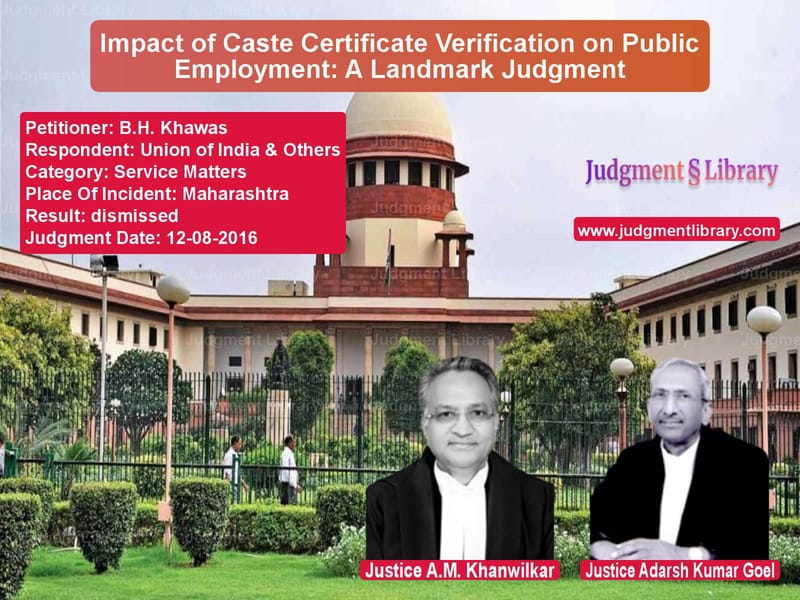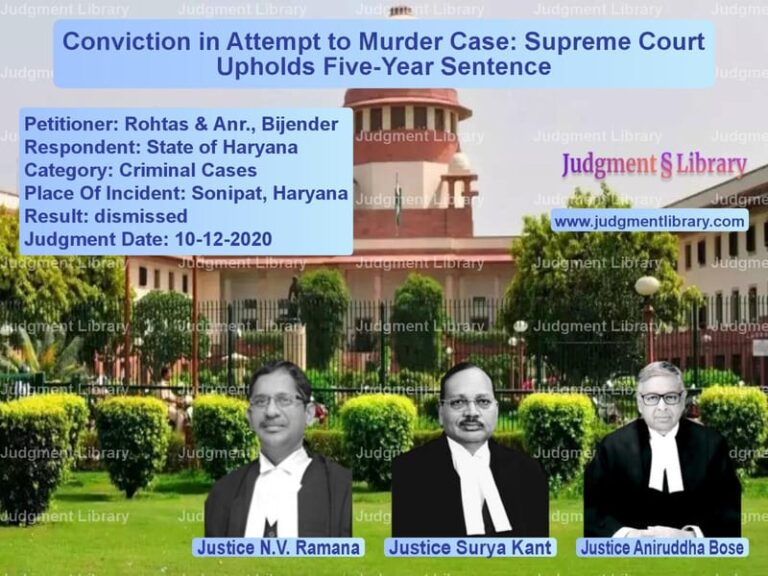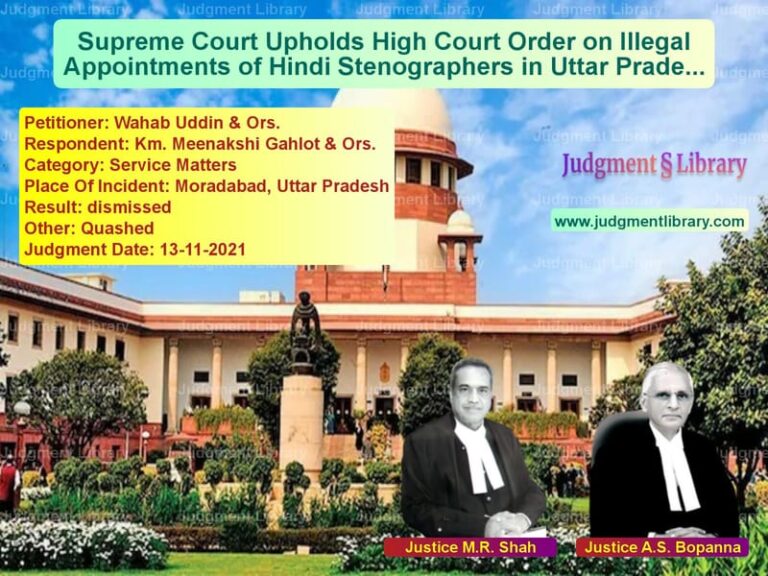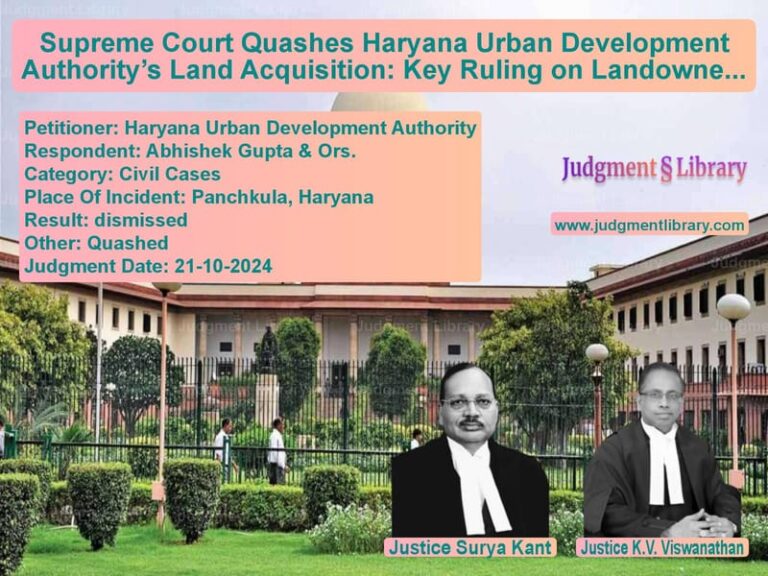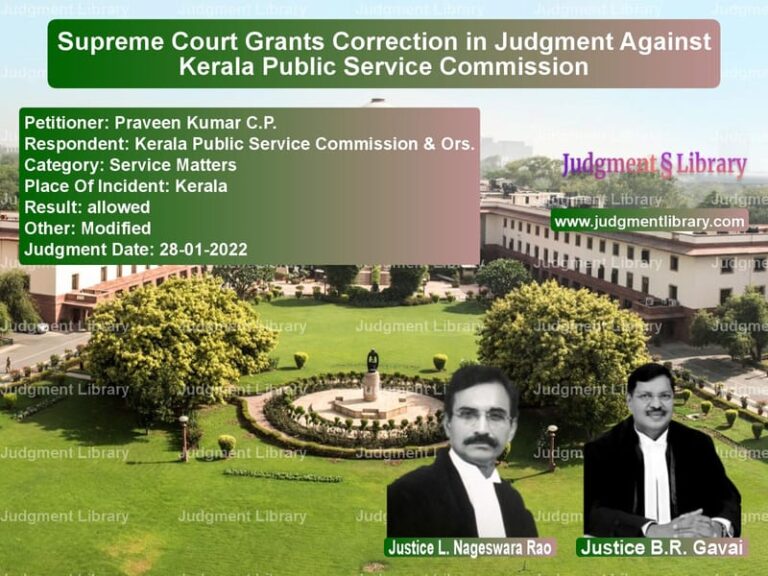Impact of Caste Certificate Verification on Public Employment: A Landmark Judgment
The Supreme Court of India, in the case of B.H. Khawas vs. Union of India & Others, addressed a significant issue regarding caste certificate verification and its impact on public employment. The case primarily revolved around whether an individual appointed under a caste-based reservation could continue to hold their position if their caste certificate was later found invalid. The judgment clarifies the legal position on caste-based reservations, their verification, and the consequences of misrepresentation in government service.
Background of the Case
The appellant, B.H. Khawas, was appointed as a Chemical Examiner Grade-I in the Customs and Central Excise Department in 1995 against a Scheduled Tribe (ST) reservation quota. His appointment was provisional, subject to verification of his caste certificate. However, in 2001, the Caste Certificate Scrutiny Committee determined that he belonged to the Koshti caste, which was not recognized as a Scheduled Tribe in Maharashtra.
Based on this finding, his caste certificate was declared invalid, leading to his termination in 2004. Khawas challenged this decision, arguing that his appointment should be protected under judicial precedents that shield final appointments from cancellation due to caste certificate invalidation. However, the government maintained that his appointment was always provisional and dependent on the outcome of the caste certificate verification.
Arguments of the Petitioner
The appellant, B.H. Khawas, presented the following arguments:
- His caste certificate was issued based on school records that identified him as belonging to the Halba Scheduled Tribe.
- He obtained the caste certificate in good faith and had no intention to commit fraud.
- The Supreme Court’s Constitution Bench ruling in State of Maharashtra vs. Milind (2001) protected appointments that had already been finalized before the judgment.
- He had served in various government departments under the ST quota without any objections until the Scrutiny Committee’s findings in 2001.
- Since he had been confirmed in previous government positions based on the same caste certificate, his appointment in the Customs and Central Excise Department should also be protected.
Arguments of the Respondent
The Union of India, representing the respondents, contended:
- The appointment was provisional and explicitly subject to caste verification.
- The Scrutiny Committee’s findings were conclusive in determining the appellant did not belong to a recognized Scheduled Tribe.
- The precedent set in Milind’s case only protected appointments that had attained finality, which was not applicable to Khawas’s case since his appointment was provisional.
- Permitting such appointments to continue would undermine the reservation system.
- The government had a duty to ensure that only legitimate candidates benefit from reservation policies.
Supreme Court’s Judgment
The Supreme Court, in a detailed judgment authored by Justice A.M. Khanwilkar and Justice Adarsh Kumar Goel, ruled against the appellant. The key findings were:
- The appointment of the appellant was always conditional upon caste certificate verification.
- The caste certificate was conclusively determined to be invalid.
- Unlike other cases where individuals had completed their education or had confirmed appointments, the appellant’s appointment had not been finalized.
- The protection granted in Milind’s case was only applicable to appointments that had attained finality, which was not the case here.
- Maintaining such appointments would deprive legitimate Scheduled Tribe candidates of their rightful opportunities.
- The appellant’s previous employment history did not automatically validate his caste claim.
Analysis of the Judgment
The ruling underscores the importance of caste certificate verification in public employment. While earlier judgments protected finalized appointments, the Supreme Court clarified that such protection does not extend to appointments that remain provisional. This judgment reinforces the principle that reservations in public employment are meant for genuine beneficiaries and that verification mechanisms must be followed rigorously.
Implications for Reserved Category Employees
The case highlights several key takeaways for individuals seeking employment under reserved categories:
- Individuals must ensure the authenticity of their caste certificates before applying under a reserved category.
- Government departments have the right to conduct thorough verifications and take action based on the findings.
- Even after years of service, an appointment can be terminated if it is found that the individual does not belong to the reserved category they claimed.
- Legal protections exist only for those whose appointments have attained finality, meaning the government has formally confirmed them without any pending verification.
Impact on Government Recruitment Policies
This ruling will likely influence future government recruitment policies, particularly regarding:
- More stringent verification processes at the time of appointment.
- Greater scrutiny of caste certificates before finalizing appointments.
- Legal recourse for individuals who are wrongly accused of misrepresenting their caste status.
Conclusion
The Supreme Court’s decision in B.H. Khawas vs. Union of India & Others reaffirms the integrity of reservation policies and ensures that benefits reach the right candidates. The judgment serves as a reminder that caste certificate verification is a crucial process and that appointments made under false claims can be revoked, even after several years of service.
This ruling will have a lasting impact on how government departments handle caste certificate verifications and will serve as a precedent in similar cases. It also highlights the necessity of due diligence for both government agencies and applicants when dealing with caste-based reservations.
Don’t miss out on the full details! Download the complete judgment in PDF format below and gain valuable insights instantly!
Download Judgment: B.H. Khawas vs Union of India & Oth Supreme Court of India Judgment Dated 12-08-2016-1741878509642.pdf
Direct Downlaod Judgment: Direct downlaod this Judgment
See all petitions in Employment Disputes
See all petitions in Recruitment Policies
See all petitions in Public Sector Employees
See all petitions in Judgment by A M Khanwilkar
See all petitions in Judgment by Adarsh Kumar Goel
See all petitions in dismissed
See all petitions in supreme court of India judgments August 2016
See all petitions in 2016 judgments
See all posts in Service Matters Category
See all allowed petitions in Service Matters Category
See all Dismissed petitions in Service Matters Category
See all partially allowed petitions in Service Matters Category

